

Toolkit for Local Governments - 10 Essential. A ten-point checklist and the building block for disaster risk reduction, developed in line with the five priorities of the Hyogo Framework for Action 2005-2015: Building the Resilience of Nations and Communities to Disasters.
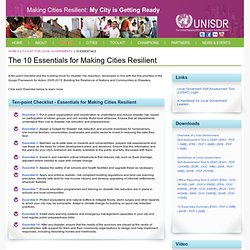
Click each Essential below to learn more. Essential 1: Put in place organization and coordination to understand and reduce disaster risk, based on participation of citizen groups and civil society. Build local alliances. Ensure that all departments understand their role to disaster risk reduction and preparedness. Essential 2: Assign a budget for disaster risk reduction and provide incentives for homeowners, low-income families, communities, businesses and public sector to invest in reducing the risks they face.
Autour de John Frazer : Quelques acteurs de l’approche morphogénétique en architecture. This Is My City Calgary Home Page. BORDEAUX. Structures. LaBidouillerie. Geographic Information Systems. ECOLOGIE+POLLUTION - ECOLOGIE-Des… - ECOLOGIE-Carrières… - … - ART-ECOLO-3D… - … Anyone Corporation \ Article. If I can take a ride in a driverless car on a public street, then I see no reason why my building can't wiggle a little Excerpt from Log 28, Summer 2013 GREG LYNN: I'm interested in all the people with CNC routers cutting the walls that are in all the hotel lobbies I go to, if they've ever even seen a Frank Lloyd Wright block house.
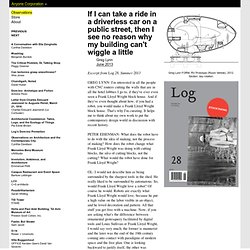
And if they've even thought about how, if you had a robot, you would make a Frank Lloyd Wright block house. That's why I'm curating. It helps me to think about my own work to put the contemporary design world in discussion with recent history. PETER EISENMAN: What does the robot have to do with the idea of making, not the process of making? Klong Toey Community Lantern.
Homegrown Cities. Creating an innovative path for Mumbai: Combining local construction skills and best practices from around the world We are trying to do something new and exciting.
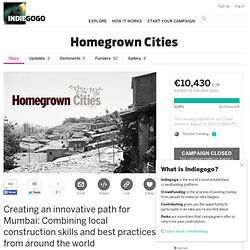
We need your help to demonstrate a different way for cities to develop, based on local participation, starting in the city of Mumbai. Summary We are inspired by what already exists in “homegrown” neighbourhoods, many of which are unfairly called slums. We want to work together with the people who live in them, and feel there is much to learn from their extraordinary courage, vitality, pride, friendliness and passion.
In Mumbai, and many big cities of India, people living in growing, locally built neighborhoods get frequently evicted. Almost every time “rehab” mass housing replaces homegrown “slums”, they are cheaply built, poorly designed, non-adapted and expensive to maintain. New ways to understand architecture. Una educación fuera de lugar… en otro lugar (al hilo del CCCD I) Posted by Adolfo on Wednesday, June 12, 2013 · Leave a Comment Una de las aventuras más excitantes del último año ha sido el CCCD, como hemos conocido coloquialmente por sus siglas al máster de Comunicación, Cultura y Ciudadanía Digitales (CCCD).
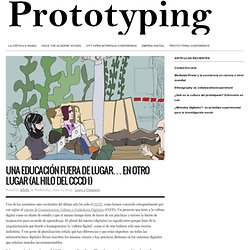
Un proyecto que tiene a la cultura digital como su objeto de estudio y que al mismo tiempo trata de hacer de sus prácticas y valores la fuente de inspiración para su modo de aprendizaje. El plural del máster (digitales) es significativo porque huye de la singularización que tiende a homogeneizar la ‘cultura digital’, como si de esta hubiera sólo una versión indistinta.
Y ese gesto de pluralización señala que hay diferencias y que estas importan: no todas las infraestructuras digitales llevan inscritos los mismos valores y hay prácticas distintas en los entornos digitales que señalan mundos inconmensurables. Y de entre todas las versiones, el CCCD opta por la cultura libre.
Coworking et nouvelles organisations des agences. Dans ce blog, vous nous avez souvent entendu parler de coworking et espaces collaboratifs pour l’architecture.
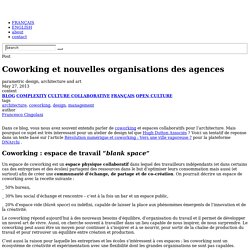
Mais pourquoi ce sujet est très interessant pour un atelier de design tel que Hugh Dutton Associés ? Voici un tentatif de reponse dans un texte basé sur l’article Révolution numérique et coworking : Vers une ville vaporeuse ? Pour la plateforme DNArchi . REaction workshop. According to a forecast by the United Nations (UN), 70% of the world population will live in urban courts in 2050. In addition, the UN warns that the increasing population in cities can become a serious urban issue, unless citizens reach a balance between the social and environmental aspects and among themselves.
The concept of “Smart City” (associated to the concept of “Smart Growth”), is proposed in a social context where infrastructure and population of urban areas continue to grow, in many cases, dispro- portionately. Therefore a “Smart City” is the one that uses technological advances and tools to support and improve the quality of life of its citizens. As a result of this phenomenon of transformation, it is imperative to recognize and understand the new schemes and systems of configuration, growth and development of cities, related to the Informa- tion and Communication Technologies (ICTs).
Smart cities make instrumented, interconnected and intelligent systems. Carlo Ratti: The Digitalization of Cities: Sketching a Future Urban Scenario. The recent history of urbanization has evolved quite contrary to common expectations.
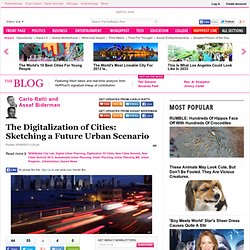
In the 1990s, scholars speculated about the impact of the ongoing digital revolution on the viability of cities. The mainstream view was that, as digital media and the Internet had killed distance, they would also kill cities. Technology writer George Gilder proclaimed that "cities are leftover baggage from the industrial era" and concluded that, due to the continued growth of personal computing, telecommunications and distributed production, "we are headed for the death of cities. " As it turned out, not only did they survive -- cities are now undergoing the largest scale of growth in human history, with more than 60 percent of the world expected to live in urban areas by 2020.
Yet, digitization has a profound effect on cities. We can illustrate this change with an analogy to the world of Formula One car racing.
aRq.transdiciplines/shs. aRq.errances/ville informelles/habiter. M/fav/slum/bidonvilles.